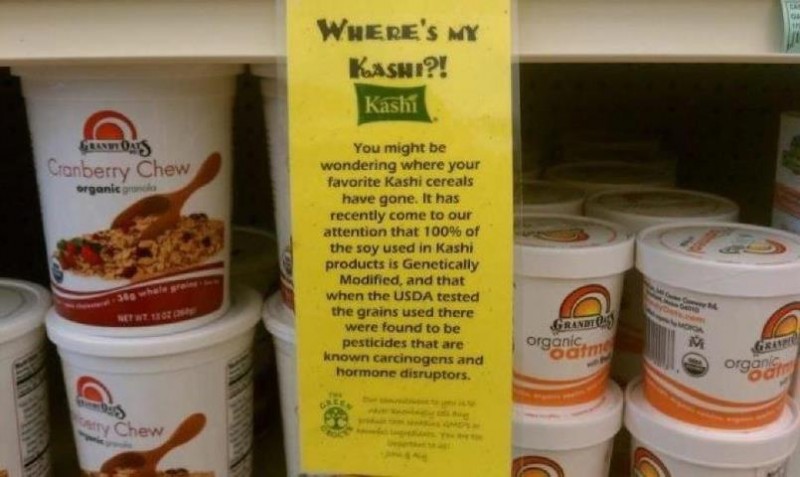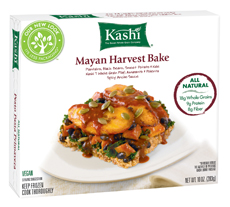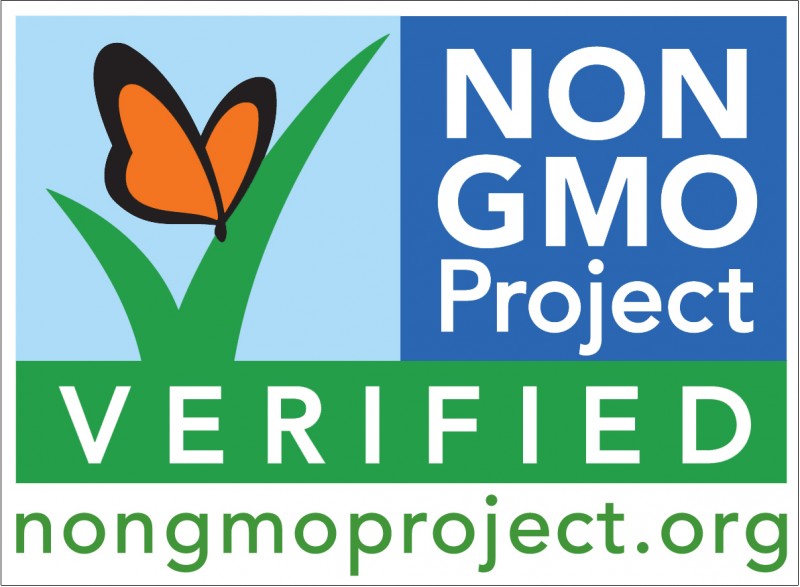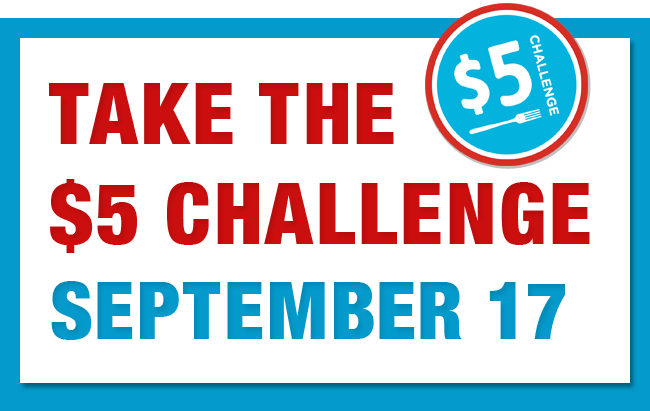This photo taken at a supermarket called The Green Grocer in Porthsmouth, RI, has been circulating Facebook like wildfire:

The yellow signs read: “You might be wondering where your favorite Kashi cereals have gone. It has recently come to our attention that 100% of the soy used in Kashi is Genetically Modified and that when the USDA tested the grains used there were found to be pesticides that are known carcinogens and hormone disruptors.”
Kashi’s Facebook feed is blowing up with dissatisfied consumers who have taken note of the image on Facebook and were apparently unaware either of the use of GMOs in most brands on store shelves or had fallen victim to corporate marketing schemes. (Kashi was previously an independent company. After a takeover by Kellogg’s, the organic labeling slowly disappeared while Kashi maintained its “natural” presence on store shelves. Kashi is sold in the “natural and organic” aisle of my local grocery store, but thanks to the documentary, Food Inc., I’ve known about these marketing ploys for some time.) It is because of deception techniques such as these that I began this blog and will admit to daydreaming about a covert rebel mission where I place signs similar to The Green Grocer’s on my local store’s shelves.
 So, I’m sitting here rubbing my hands together and cackling like a devious arch-villain at the thought of Kashi/Kellogg’s marketing team scrambling to “fix” this media shit-show. Kashi did post this photo, touting seven of their products that are certified organic and labeled non-gmo. The sad truth is that nothing will be done to change their other 84 products, though, until consumers stop buying their goods. Why?
So, I’m sitting here rubbing my hands together and cackling like a devious arch-villain at the thought of Kashi/Kellogg’s marketing team scrambling to “fix” this media shit-show. Kashi did post this photo, touting seven of their products that are certified organic and labeled non-gmo. The sad truth is that nothing will be done to change their other 84 products, though, until consumers stop buying their goods. Why?
KASHI HAS DONE NOTHING WRONG.
You read that right. At least in a legal sense, Kashi has done nothing but try to sell a product to the American public, using fads and an image that is appealing to a certain type of buyer. There are currently no laws against using words like “good,” “all-natural,” and “whole grain,” nor against clean-looking packaging nor against using unique ingredients. None of these attributes makes a product necessarily “good for you,” but it does make a product appear “better for you” in a sea of other processed goods.
This is why it is important to know the facts.
What you can do:
 1. Support efforts to change the law. Visit Just Label It and Non-GMO Project to find out more about the hunt to pinpoint GMOs in our food.
1. Support efforts to change the law. Visit Just Label It and Non-GMO Project to find out more about the hunt to pinpoint GMOs in our food.
2. Know who owns what. It is not always the case, but more often than not, a larger company isn’t as concerned with a quality product as they are about the bottom line. Check out the Who Owns Organic? brand list.
3. Understand that the terms “organic” and “natural” don’t mean ALL ingredients are organic nor that anything about the product is healthy. Read your labels. Check out this shopper’s guide (also an app!) from Center for Food Safety.
4. Purchase organic produce from local growers (or grow your own!) as much as possible. Eat unprocessed foods.
5. Follow Healthful Mama! Get news, resources, recipes, and links straight to your inbox. You can also catch extra stories that aren’t posted on the blog by following my Facebook page or catch me on Twitter.
Because Kashi is such a mainstream brand, I hope this recent negative attention to their brand brings light to the issue of GMOs found in all foods.



Hey- Delete my comment. You have a typo at the end of the article for the Facebook like, forgot the e. Great article- thanks for the info!
Hi Anna, thanks for the proofreading check! I fixed the error 🙂 Thanks for reading!
Great information in a sea of blind outrage. Thanks!
Thank you, dp!
http://www.kashi.com/nongmo
But, then why this? They must be doing something to change.
gwyn – If you actually read the article above, you’d have read this, “Kashi did post this photo, touting seven of their products that are certified organic and labeled non-gmo. The sad truth is that nothing will be done to change their other 84 products, though, until consumers stop buying their goods. Why?”
They are doing something to change – only AFTER the sh*t-storm that has come down the pipes in the last few days…but currently only to seven of their products. The problem remains that more and more companies and calling their products ‘natural,’ make their way into my natural selection portion of my grocery store and appear to make false claims.
It is worth noting that the non-GMO project does not verify products as being free from GMOs prior to enrollment. It is only after they receive their enrollment fees do they “schedule a visit”, and again, it’s only if they deem it necessary. Check out their verification process.
Also, see this excerpt from the Cereal Report by the Cornucopia Institute: “Furthermore, the Non-GMO Project, which “enrolls”
products before it verifies them as being non-GMO,
may give consumers a false sense of security. Our test
results reveal that several “enrolled” products were in
fact made with GE ingredients.”
Marilyn, thank you! I’ve been a little skeptical of the Non-GMO project mainly due to the sudden explosion of products touting its label. I appreciate the facts you’ve provided here. The bottom line is that we cannot (unfortunately) trust many large companies to practice what they hope they are preaching.
Thanks for explaining this. I saw the photo on facebook, but hadn’t bothered to read what the deal was. Thanks for listing the resources too. I’ll have to check those out, and my husband will be further convinced that I’m insane while grocery shopping.
Thank you for this great information! No more GMOs…
Please forgive my ignorance but what is wrong with genetically engineered foods? I am not very knowlegable about these things but aren’t the foods being modified to be more resistant to diseses and more nutritious? I understand that it is scary to think what scientists can do but shouldn’t we be looking for ways to produce a better and more abundant food supply given the global population explosion happening right now? We shouldn’t back away from something just because it sounds scary or we don’t understand it. I enjoy eating Kashi cereal beacuse it has so much more fiber and protein than any other “health” cereal on the market. If the cereal has pesticides in it, that’s one thing, but if the soybeans are genetically modified to have a longer shelf life without artifical preservatives or to be more resistant to bacteria, fungi, etc. – what’s the damage? Are there any studies to show that GM foods are bad for people? Thanks.
Hi David, I’m sorry my reply didn’t show earlier. I think genetically-engineered foods/seeds *can* be okay under the proper circumstances (if we must accept the fact that we are operating agrarian business on such a large scale). The problem lies, however, in when that GM technology is not used to benefit the plant, but to benefit the business, i.e. Monsanto. How is the consumer to know which GM plant is okay to consume and which one isn’t? Additionally, studies are showing that since the plants are engineered to perform a certain way, the natural world either doesn’t recognize them (think honeybees) or evolves to compensate–and the ecosystem is thrown out of whack. Case in point: http://www.rodale.com/gmo-corn
And if there is nothing wrong with GMOs, why is there such an effort to prevent labeling. Just label it and each of us can decide for ourselves
Hey Healthful Mama, Thank-you for taking up the standard in providing information for food shoppers! It’s been over six months and the dust cloud has settled since this took place. I wanted to thank you for all you do in educating people about the choices they have, the power we all have every day by voting with our forks, and to ask to add one more point to really great 5 points you have listed in this article; Support Your Local Grocer. Find an independently, locally owned natural/organics food store and support them. These are the people that started this movement, these are the people that are passionate about food, and they typically have the most intimate knowledge of the foods they sell. If you’re shopping at a chain grocer (regardless of the name) then they have pressures to meet certain demands whether that be industry related or financial related. Your independent locally owned grocer is the most powerful tool in shifting those important food dollars towards a more sustainable and healthful system. Thanks again!
Thank YOU! =D
Hello Healthful Mama,
I only recently discovered your blog, so forgive my late response to this posting on Kashi and GMO’s. David O asked in the Comments section about why one should be concerned about GMO’s. With all due respect, there is MUCH more to the dangers of GMO’s than you let on in your response to him (but I realize you may have addressed these concerns elsewhere, and not in the Comments section’s limited format).
May I suggest you direct readers who have questions about this topic to the excellent documentary, “Seeds of Death”? “Seeds of Death” is currently being broadcast on Colorado Public Television, where I first saw it, and it is extremely well-researched and quite compelling.
The full video has been posted by its director on YouTube here:
http://www.youtube.com/watch?v=eUd9rRSLY4A
Thanks for a great blog!
RJ
Boulder
And another excellent documentary, “Genetic Roulette: The Gamble of Our Lives” is also making the rounds of public television, and is also available for viewing in its entirety on YouTube:
http://www.youtube.com/watch?v=taLw2LhPoTU